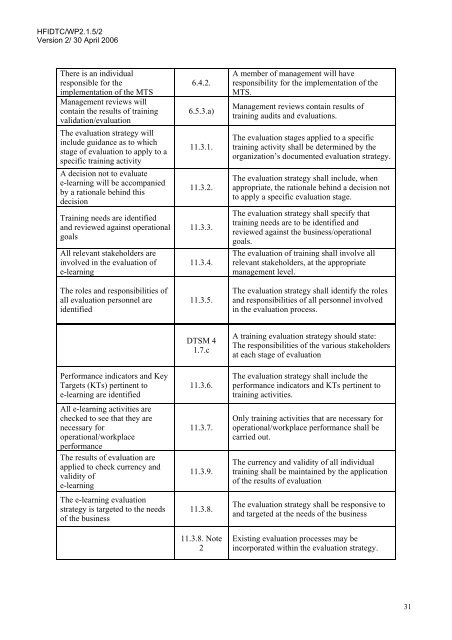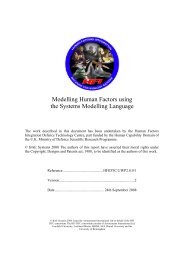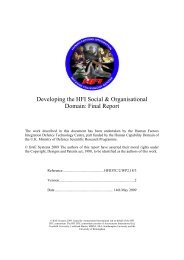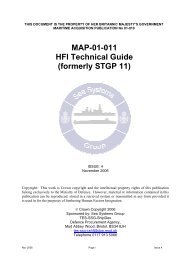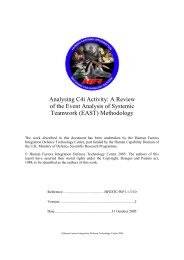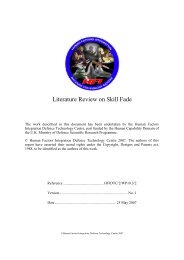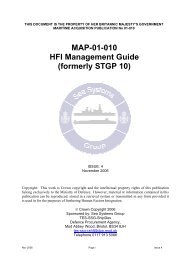E-learning Instructional Design Guidelines - Human Factors ...
E-learning Instructional Design Guidelines - Human Factors ...
E-learning Instructional Design Guidelines - Human Factors ...
Create successful ePaper yourself
Turn your PDF publications into a flip-book with our unique Google optimized e-Paper software.
HFIDTC/WP2.1.5/2<br />
Version 2/ 30 April 2006<br />
There is an individual<br />
responsible for the<br />
implementation of the MTS<br />
Management reviews will<br />
contain the results of training<br />
validation/evaluation<br />
The evaluation strategy will<br />
include guidance as to which<br />
stage of evaluation to apply to a<br />
specific training activity<br />
A decision not to evaluate<br />
e-<strong>learning</strong> will be accompanied<br />
by a rationale behind this<br />
decision<br />
Training needs are identified<br />
and reviewed against operational<br />
goals<br />
All relevant stakeholders are<br />
involved in the evaluation of<br />
e-<strong>learning</strong><br />
The roles and responsibilities of<br />
all evaluation personnel are<br />
identified<br />
6.4.2.<br />
6.5.3.a)<br />
11.3.1.<br />
11.3.2.<br />
11.3.3.<br />
11.3.4.<br />
11.3.5.<br />
A member of management will have<br />
responsibility for the implementation of the<br />
MTS.<br />
Management reviews contain results of<br />
training audits and evaluations.<br />
The evaluation stages applied to a specific<br />
training activity shall be determined by the<br />
organization’s documented evaluation strategy.<br />
The evaluation strategy shall include, when<br />
appropriate, the rationale behind a decision not<br />
to apply a specific evaluation stage.<br />
The evaluation strategy shall specify that<br />
training needs are to be identified and<br />
reviewed against the business/operational<br />
goals.<br />
The evaluation of training shall involve all<br />
relevant stakeholders, at the appropriate<br />
management level.<br />
The evaluation strategy shall identify the roles<br />
and responsibilities of all personnel involved<br />
in the evaluation process.<br />
Performance indicators and Key<br />
Targets (KTs) pertinent to<br />
e-<strong>learning</strong> are identified<br />
All e-<strong>learning</strong> activities are<br />
checked to see that they are<br />
necessary for<br />
operational/workplace<br />
performance<br />
The results of evaluation are<br />
applied to check currency and<br />
validity of<br />
e-<strong>learning</strong><br />
The e-<strong>learning</strong> evaluation<br />
strategy is targeted to the needs<br />
of the business<br />
DTSM 4<br />
1.7.c<br />
11.3.6.<br />
11.3.7.<br />
11.3.9.<br />
11.3.8.<br />
11.3.8. Note<br />
2<br />
A training evaluation strategy should state:<br />
The responsibilities of the various stakeholders<br />
at each stage of evaluation<br />
The evaluation strategy shall include the<br />
performance indicators and KTs pertinent to<br />
training activities.<br />
Only training activities that are necessary for<br />
operational/workplace performance shall be<br />
carried out.<br />
The currency and validity of all individual<br />
training shall be maintained by the application<br />
of the results of evaluation<br />
The evaluation strategy shall be responsive to<br />
and targeted at the needs of the business<br />
Existing evaluation processes may be<br />
incorporated within the evaluation strategy.<br />
31


